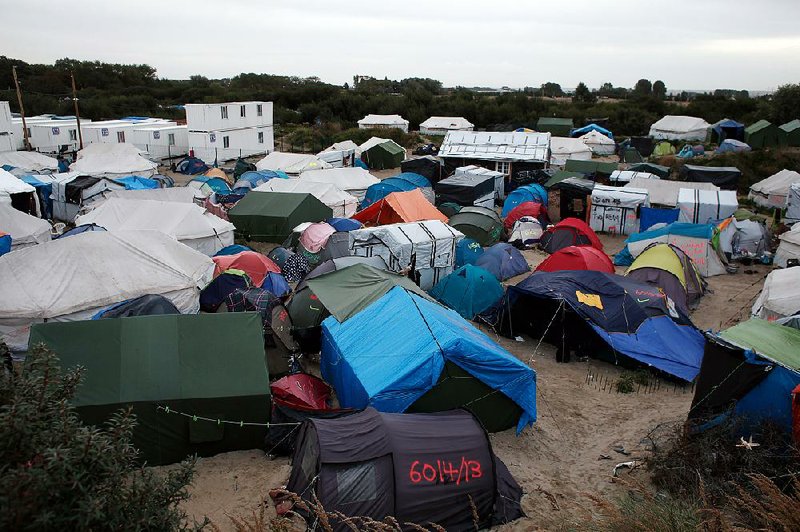CALAIS, France -- The migrant camp in Calais must be fully dismantled by the end of the year, French President Francois Hollande said Monday, addressing a major issue for his Socialist government ahead of next year's presidential election.
Hollande, who was visiting Calais for the first time since winning office in 2012, said the camp known as "the Jungle" is a "humanitarian emergency."
Authorities say about 7,000 people live in squalid conditions near the port of Calais, hoping to get to Britain, which is 31 miles away from the camp at the edge of the English Channel. Aid groups say the number of people living there is closer to 10,000.
French authorities have tried for 18 months to dismantle the camp. In their last attempt, in March, when about 4,000 people lived there, they leveled almost half of it. But since then, the camp has doubled in size.
Hollande, who is eyeing a re-election bid, is facing harsh criticism from conservative and far-right rivals who say the camp is a symbol of his failure to deal with Europe's migrant crisis.
Former President Nicolas Sarkozy, who is competing to win the conservative primary, promised last week in Calais that he could solve the issue in a few months by re-establishing strict border controls all around the country.
France is a member of Europe's zone of passport-free travel, while Britain is not.
In a speech to police forces securing the area, Hollande vowed to shut the camp "with method and determination" so that new camps don't appear near Calais or elsewhere across France.
Hollande said police forces will remain in the area "as long as needed" after the camp is shut.
"We must guarantee a durable and effective sealing of the French-British border," he said, insisting that British authorities must also do their part.
He expressed opposition to renegotiating the 2003 treaty that effectively puts the British border in Calais. Sarkozy, who signed it as interior minister, now wants to send migrants to a center on British territory.
"This would be too easy to say: 'Let them go to the U.K.' ... That would largely open the stream [of migrants]," Hollande said in a second speech in the port of Calais.
The government announced plans in the summer to disperse Calais migrants to centers across France, where they will be able to apply for asylum. The government has not given a firm timeline.
Hollande reaffirmed that plan Saturday when he visited one of France's 164 migrant reception centers in the central city of Tours.
Reception centers will hold 40-50 people for up to four months while authorities study their cases. Migrants who don't seek asylum will be deported.
In a letter to Hollande, eight nonprofit organizations helping migrants called for a long-term policy of hospitality and integration in France. They criticized the dismantling of the Calais camp as a "short-term view that does not solve anything for the dozens of people who will continue to arrive every day in Calais."
"In Calais and elsewhere, France does not respect human rights," they wrote.
British lawmaker Charlie Elphicke of the city of Dover, across the channel, said Monday that "the French government needs to make sure it actually happens this time and that the people they remove are stopped from just moving back to Calais."
"Britain has already paid millions for walls and fences in Calais. Yet the French keep asking for more of our money. Our taxpayers' money should be spent on more border security at Dover and in the English Channel," Elphicke said.
Nearly 100 people arrive from Afghanistan, Sudan, Eritrea and elsewhere per day to the Calais camp. Space has grown so tight that the fresh arrivals, overwhelmingly young men, spend hours looking for a free spot to pitch their tents.
"I don't want to go to school," said Mohammed Zakaria, a 25-year-old Sudanese man who shares a 12-by-7-foot tent with nine others. "I want to go to England."
Zakaria said that no matter the conditions in Calais, he does not want to go back to Sudan.
With no income and no means to make money, the migrants have little to do with their time but to wait for any opportunity to cross into Britain.
Already, 12-foot-high fences topped with barbed wire stretch more than a mile along the highway to the port of Calais to prevent migrants from storming the cargo trucks entering the tunnel under the channel on their way to Britain. There are regular police sweeps with tear gas to keep migrants away.
Migrants and their smugglers deliberately induce accidents to stop traffic so they can board trucks. This month, fed-up truckers blocked traffic bound for Calais on the English side of the tunnel in protest.
In the meantime, the camp has taken on an air of increasing permanence, to the frustration of local people.
"For six months they've allowed construction to take place, they've allowed migrants to arrive," said the mayor of Calais, Natacha Bouchart, who said the port is losing money and who has led protests against the camp. "There's been a very sharp worsening of the situation."
Information for this article was contributed by Danica Kirka of The Associated Press and by Adam Nossiter and Tyler Hicks of The New York Times.
A Section on 09/27/2016

